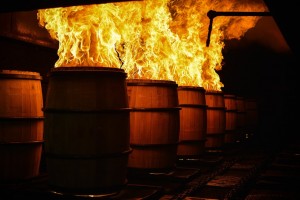
Whiskey’s Essential Ingredient – Wood
If we were to line-up the ingredients utilized to create Whiskey we would gather grain (of varying types and forms depending upon the Whiskey we are making), water, yeast, and WOOD!
Among all of the materials used in the creation of Whiskey wood is the most important of all contributing anywhere from 50% to 80% of Whiskey’s aromas and flavors. This ratio of wood’s impact varies greatly due to the type of Whiskey, the time in wood, and the climate in which it is matured. Straight Bourbon requires new barrels so clearly the impact is more profound.
There are clear and simple reasons to why the world’s greatest Whiskey types, Straight Bourbon, Irish, and Scotch Whiskies are all required to be aged in cask for a period of no less than two years, as is the case for Bourbon, and three years for Irish and Scotch Whiskies.
Aging whisky in wood is not at all passive. It is quite active. Congeners in the spirit have time to react with each other. They are accelerated by careful interaction with oxygen and many of the wood’s compounds including sugars, tannins, lignin, and lactones, glycerol, fatty acids, and a dozens of aldehydes (vanillin being essential). Wood being a solid contributes solids to the whiskey in the form of various sugars and glycerol to name a few. In simple terms wood contributes flavor, aroma, and texture. Producing Whiskey without wood is akin to making a soufflé with no eggs.
Whiskey’s Wood of Choice – Oak
The mighty oak has always been more than just a tree; it is a symbol of strength. The oak is an important symbol in both Celtic and Norse mythology. The wearing of oak leaves was a sign of special status among the Celts and later by the ancient Greeks and Romans. Today oak leaves and clusters are used to denote rank in many of the world’s military forces.
For the maturation of Whiskey the wood of choice is oak. There are hundreds of varieties of oak but just a few that work ideally for the maturation of Spirits or Wine.
The genus name for oak is Quercus (kwarkes). In America the ideal cask oak is White Oak or Quercus Alba. In Europe the sub-varieties are Quercus Robur and Quercus Petraea. Oaks hybridize with an indiscretion most commonly associated with Lindsay Lohan’s activities on the Sunset Strip so the classic European varieties (robur and petraea) have become one in some forests.
One of the things that make these varieties of oak so desired for the production of casks is what makes these oaks attractive to ship builders. The American colonists were immediately drawn to the tall straight White Oak for ship timbers. These trees built England’s Royal Navy fleets for decades. In addition to being straight the white oak is tight grained, easily bent when heat is applied, and resistant to leakage.
American versus European Oak – Aging Whiskey
European oak is more easily penetrated by liquid, especially spirits, and allows greater oxygen flow. American oak is lower in tannins as compared to its European counterparts while contributing more flavor compounds that are agreeable in Spirits and some would argue less agreeable in most Wines. In the simplest of terms American oak has stronger flavors than European oak.
Previous Use and Oak Virginity
Oak’s influence is first determined by the type of oak, its previous use or virginity, where it was grown, when felled, how it was dried, how it was cut, and the cooperage (how the barrel was made).
This is of great importance for both Irish and Scotch Whiskies. The two most popular types of used casks utilized for Whisky maturation are Bourbon and Sherry casks. Many falsely simplify the discussion by stating that Sherry casks = European oak while Bourbon casks are made with American oak. Not so fast.
What these Scotch Whisky sellers and instructors fail to mention or even consider is that a great portion of the casks used to mature Sherry are made in America from American oak. This new mantra we now hear from the Scotch whisky producers is seemingly a reaction to fielding questions regarding the influence of the previous wine or spirit on the mature Scotch Whisky.
The talking point is to refer to casks as American oak and European oak rather than Bourbon casks or Sherry casks. The decision to do so must be to marginalize the affect of the original Spirit held in the cask. In truth, the original wine or spirit contributes to the flavor of Irish or Scotch Whisky and that is okay if not desired. Anyone who has tasted a great number of Single Malt Scotch Whisky’s would be quick to tell you that influence of Bourbon and Sherry on the respective Whisky is undeniable.
Regardless of origin, oak casks are essential to Whiskey and so much so that even the world’s finest grain Spirit cannot sensibly adorn itself with the moniker of Whiskey without living a portion of its life in wood. In many instances the law requires such action and where these laws have no jurisdiction, logic prevails.
